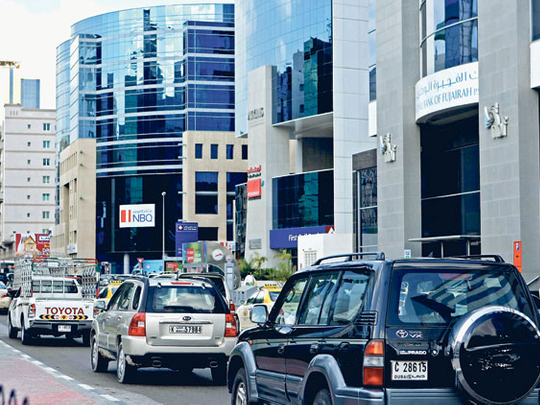
Abu Dhabi: Just days away from the first banking income reports in 2010, and with Dubai World seemingly in the rear-view mirror, investors and analysts appear confident the numbers will come out positive.
The reasoning: they cannot possibly be lower than those of the first or fourth quarters of 2009.
"Volume growth and margin expansion in 2010 will be challenging considering the difficult economic environment we have in the country," said Deepak Tolani, interim head of research at Al Mal Capital in Dubai. "Provisions, although hefty, should grow at a slower rate in the first two quarters of 2010."
Tolani said he expects the sector's first-quarter profits to be highly influenced by the level of provisioning which accelerated through the year in 2009. Some banks may have pulled forward provisions into the fourth quarter, he said, leaving the first half of 2010 relatively clean.
Provisions against non-performing loans (NPL) and investments weighed heavily on 2009 results. The slow economy and tightening of Central Bank provisioning rules have forced banks to increase their provisions by more than 73 per cent last year to Dh45.8 billion.
Positive sentiment
At the end of trading in Abu Dhabi and Dubai yesterday, all listed banks had either advanced or remained unchanged with the exception of Sharjah Islamic Bank.
The fact investors are once again buying into the banks could be interpreted as part of a mini-correction after a long week of declines for both markets, but it could also be a reflection of the return of positive sentiment for the sector, at least for the short-term.
On Thursday, Standard and Poor's (S&P) downgraded three Dubai companies and placed four Abu Dhabi companies on negative credit watch.
But surprisingly, S&P's rating actions did not extend to the banks. In fact, Mashreq bank received a one-notch upgrade while the ratings of Abu Dhabi Commercial Bank, National Bank of Abu Dhabi, Dubai Islamic Bank and Sharjah Islamic Bank were all affirmed.
"Standard & Poor's believes that the UAE authorities have a strong incentive, as well as willingness and capacity, to preserve the stability of their banking sector," S&P said in its statement.
For its part, Moody's said it was unlikely the proposed Dubai World debt restructuring scheme would have "negative rating implications" on UAE banks.
The agency estimated potential losses would only reach 25 per cent of loan values for the most exposed banks.
The rating agency's biggest concern regarding Dubai World is its impact on lending growth, which it said could "influence bank lending to other government-related issuers in the UAE, and possibly the wider region."
"The Dubai World restructuring will continue to impact lending but it should be manageable on banks' balance sheets," said Al Mal Capital's Tolani. "The banks argue their ability to lend is hampered by lack of liquidity, however, we believe banks are unwilling to lend as the asset quality pipeline is still unclear."
Lending growth
NPLs now represent 4.4 per cent of total loans, a number expected to reach 6.4 per cent this year, according to the Central Bank. Lending grew by just 2.4 per cent in 2009, compared with 30-plus per cent growth in the five previous years.












